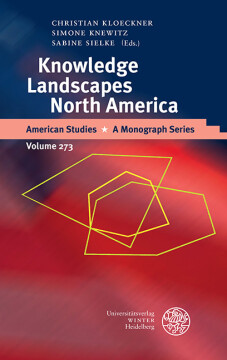
BUCH
Knowledge Landscapes North America
Herausgeber: Kloeckner, Christian | Knewitz, Simone | Sielke, Sabine
American Studies – A Monograph Series, Bd. 273
2016
Zusätzliche Informationen
Bibliografische Daten
Abstract
‘Knowledge Landscapes North America’ intervenes in current critical debates on concepts of knowledge and modes of knowledge production and circulation. As knowledge has been proclaimed an indispensable economic resource, scholarly and public discourses increasingly interrogate its established and newly evolving forms and institutions. These discussions frequently focus on North America and its knowledge landscapes, which retain their crucial position in knowledge distribution despite shifts in global power constellations. The contributions to this volume explore the particularities of these knowledge formations by raising pertinent questions: How do North American knowledge institutions drive global knowledge economies—and in which ways are they driven by them? Which agents shape North American knowledge landscapes? What conditions have been conducive to the emergence of innovative knowledges? The authors interrogate the significance of local and tacit knowledge; they reflect on marginalized or ‘forgotten’ knowledges as well as on the expertise of literature and the arts; and they map the shifting media ecologies that have affected concepts of knowledge and its circulation.
Inhaltsverzeichnis
| Zwischenüberschrift | Seite | Aktion | Preis |
|---|---|---|---|
| Cover | C | ||
| Title Page | 3 | ||
| Copyright | 4 | ||
| Contents | 5 | ||
| Sabine SIELKE, Simone KNEWITZ, AND Christian KLOECKNER, Knowledge Landscapes North America: Introduction | 7 | ||
| Knowledge Institutions, Knowledge Economies | 21 | ||
| Christopher NEWFIELD, New Roles for Academia? The American University and the Knowledge Economy | 23 | ||
| Sverker SÖRLIN, Frost on Humanities and Social Sciences? Understanding the Climate Change in North American Knowledge Landscapes | 45 | ||
| Alexander STARRE, Building Knowledge: Carnegie Libraries as Epistemic Spaces | 67 | ||
| Education and the Circulation of Knowledge | 85 | ||
| Emily PETERMANN, From the ABCs to the American Revolution: Poetry and the Construction of Children’s Knowledge | 87 | ||
| Mahshid MAYAR, From Tools to Toys: American Dissected Maps and Geographic Knowledge at the Turn of the Twentieth Century | 99 | ||
| Sophie SPIELER, The Contingency of Knowledge: "Stover at Yale" and the Debate on U.S. Elite Education | 119 | ||
| Heinz ICKSTADT, "Stoner": John Williams’s Academic Novel against Academia | 139 | ||
| Competing and Contested Concepts of Knowledge | 151 | ||
| Antje KLEY, Literary Knowledge Production and the Natural Sciences in the United States | 153 | ||
| Hubert ZAPF, Matter, Metaphor, and Cultural Ecology | 179 | ||
| Paula VON GLEICH, How Black Is the Border? Border Concepts Traveling North American Knowledge Landscapes | 191 | ||
| Frank KELLETER, Four Theses on the News | 211 | ||
| Tacit and Embodied Knowledges | 229 | ||
| Christa BUSCHENDORF, Tacit Knowledge in Edward P. Jones’s Novel "The Known World" | 231 | ||
| Jeanne CORTIEL, Knowledge on Edge: "Resident Evil", Feminism and the Rescue of the Female Child | 249 | ||
| Russell J. A. KILBOURN, Translating Affect: Inuit Cinema, Affect Theory, and Knowledge (Re-)Production | 269 | ||
| Andrew GROSS, “American Innovations”: A Conversation with Rivka Galchen and Joseph O’Neill | 289 | ||
| Contributors | 301 |


 Publishing Platform by CloudPublish
Publishing Platform by CloudPublish